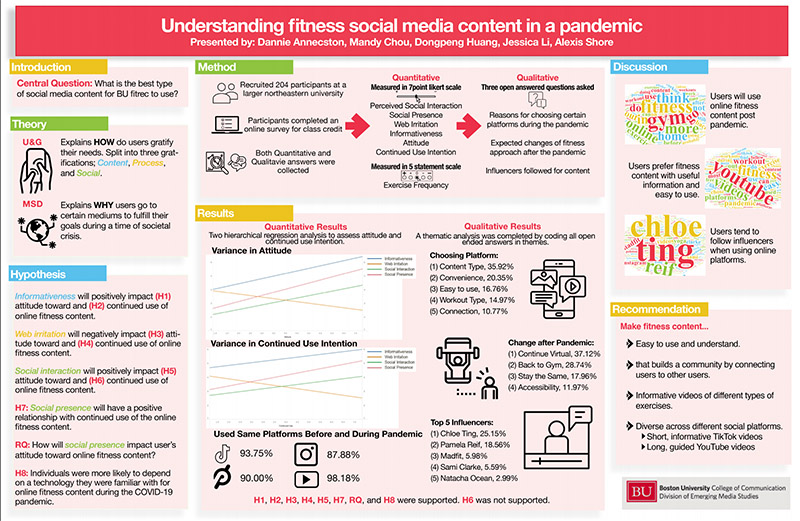Team members: Dannie Annecston, Mandy Chou, Dongpeng Huang, Jessica Li
Project mentor: Alexis Shore
View poster
Abstract
As a result of the COVID-19 regulations and closure of gyms nationwide, more people are pursuing fitness at home using online resources. Using Uses and Gratification theory (U&G) and Media System Theory (MSD), this study intends to determine which gratifications influence attitude and continued use of online fitness content. Such gratifications include informativeness, web irritation, social interaction, and social presence. An online survey was distributed to college students at a northeastern university (N = 134) collecting both quantitative and qualitative data. The results demonstrate that informativeness, social interaction, and social presence as well as web irritation significantly influenced attitude towards online fitness content (p<.05). Additionally, social presence and web irritation significantly influenced participants’ continued use of online fitness content (p<.05) This study contributes to the creation of online fitness content that is highly informative and orientated toward social presence while minimizing web irritation. Such results can be broadly applied to fitness creators and brands who leverage online fitness content.
Keywords
online fitness content; social media; COVID-19; Uses and Gratification Theory; Media System Dependency Theory; survey
Team Bio
Our group is composed of four Master’s students from the Emerging Media Studies Division at Boston University. We are grateful to have our Ph.D. lead, Alexis Shore. Our group members come from different cultural backgrounds and have diverse academic and career interests. We enjoy applying communication theories in combination with our daily social network experiences to make a comprehensive media research project.
Client Bio
Boston University Fitness and Recreation Center (FitRec) is a space that offers a high-class gym, fitness classes, and various fitness activities. FitRec has built a community of health and fitness for the wider Boston area by offering both a physical space for working out and a virtual sphere on social media to converse about healthy living. Gym structures have changed due to the COVID-19 pandemic, leading FitRec to expand their online presence to continue to be a resource for BU students, staff, and faculty. FitRec already has a strong social media presence, but they sought to understand how to best reach their stakeholders on social media in a post-pandemic world through understanding theory.
